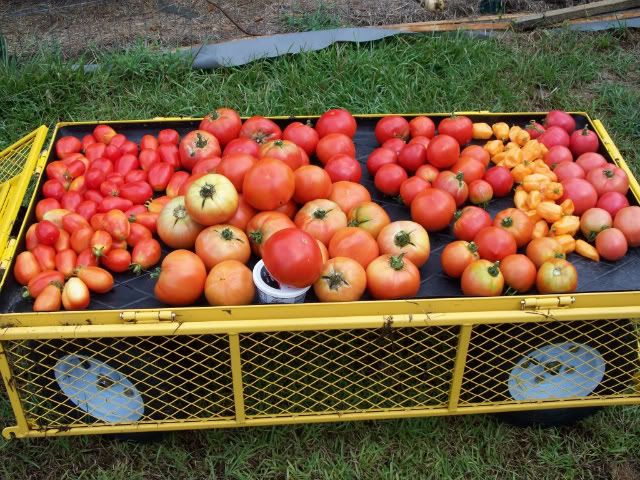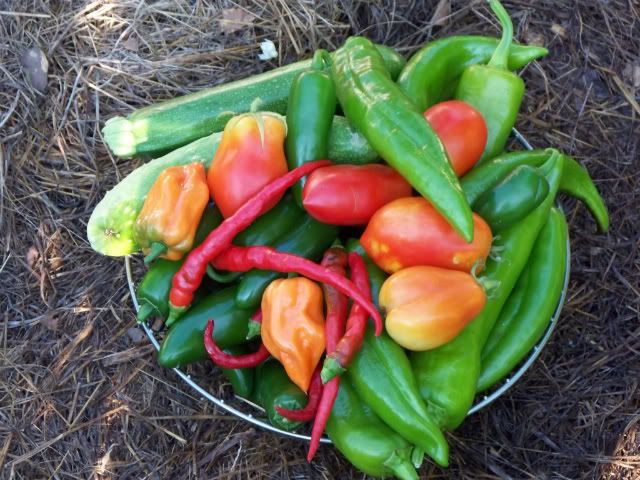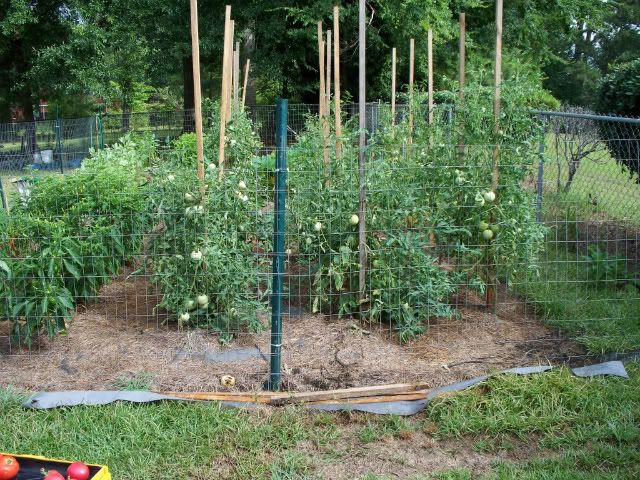


Posted on 04/05/2010 11:30:57 AM PDT by Graybeard58
With today’s tight economy, everyone is looking for ways to cut expenses. Growing a garden has the potential to reduce the amount of money spent on groceries. But this “potential” depends on the costs involved in growing the crops, types and amounts of vegetables grown, yields that are derived from the garden, and other factors. So, the answer to the above question is “yes” – if done correctly.
It’s possible to spend a small fortune on a garden. The humorous book, "The $64 Tomato" by William Alexander, discusses one man’s quest for the perfect garden and how it ended up costing him $64 per tomato (among other things). This astonishing figure is the result of all of the input costs (tools and equipment, fertilizers, pesticides, water, etc.) associated with gardening. These costs can add up quickly, even for a small vegetable garden. The trick to saving money with a vegetable garden is limiting the costs while maximizing yield.
While saving money may be one of the benefits to growing a vegetable garden – let’s not forget that there are others as well. Gardens are a potential means to increase our confidence in food safety and security. We know where the food is coming from and all the history of plants grown in our own gardens. We know what chemicals were used, we know what pests were problems and we essentially eliminated the whole resource-gobbling transportation chain to get the food to your plate. And all that gardening is good for you. It is a great form of physical exercise, and I haven’t met a nutritionist yet who didn’t think that fresh produce was “good for you” too!
So, growing your own vegetables can be rewarding, regardless of the potential savings. But with a few tips, it can save you some money on a grocery bill or two. First – you have to know a couple of basics of growing vegetables.
Vegetable Growing Basics
There are a wide variety of vegetables that can be successfully grown in Iowa. As I walk through the produce section of my grocery store, there are only a few things I see that are difficult to grow in Iowa. The location of the vegetable garden is crucial. Nearly all vegetables need full-sun and a well-drained soil. The vegetable garden also should be located near a source of water. Iowa’s climate allows production of both cool and warm season vegetables.
Cool season vegetables (carrots, beets, lettuce, cauliflower, etc.) are planted in early spring and harvested by mid-summer. Warm season vegetables (tomatoes, pepper, eggplant, squash, etc.) are planted after the danger of frost has passed and harvested by early fall. With proper planning, it’s possible to grow two or three crops in a given area during the growing season. Using the same space for two or more crops is called succession planting. Other techniques, such as interplanting and companion planting, are other ways to make efficient use of garden space. The more efficiently you use garden space and resources the larger the potential savings.
Below are several other important factors to consider when growing a vegetable garden to save you money.
Select vegetables that you like. This is simple – you’re not likely to take care of …or eat things you don’t like. So don’t waste your time or money planting them in the garden.
Select vegetables that can be easily stored or preserved. Selecting vegetables that have a long storage life or that can easily be canned or frozen is a great way to stretch your grocery dollar. Potatoes, onions, sweet potatoes, and winter squash can be stored for several months when stored at the appropriate temperature. Other vegetables, like beans, tomatoes, cucumbers, beets and sweet corn, can be preserved by canning or freezing. Preserving vegetables is a great way to enjoy the “extra” produce later in the year.
Select vegetables that are expensive to buy in the grocery store. To save money, grow more expensive items, like tomatoes and melons, or large quantities of vegetables that you purchase regularly. Consider vegetables like beans, beets, onions, spinach, broccoli, peppers, carrots, summer squash, cucumbers, tomatoes, potatoes, lettuce, peas, and Swiss chard. These vegetables provide the biggest returns on your investment of space and time in the garden.
Do some research and start with a plan. Decide what you want to grow and determine what will be necessary to be successful. Plan the garden on paper first. Establish a network of family members, neighbors, or friends that can help you answer your questions. Don’t forget about your local county extension office. There are more than 20 vegetable gardening publications from Iowa State University Extension that can help you (see table below). Each of these can be picked up at your county extension office. They can also be ordered or downloaded online at www.extension.iastate.edu/store. County extension offices are also the meeting centers for Master Gardeners – many of whom have the knowledge and experience to keep your garden growing successfully.
Research and consider ways to reduce your inputs. Collect rainwater for irrigation. Add compost and well-rotted manure to the garden to improve the soil and reduce the use of fertilizers. Practice the principles of Integrated Pest Management to control insects and diseases, reducing your reliance on pesticides. Start with high quality seeds – most are relatively inexpensive, and most can be stored for at least one or two years. Find ways to reuse containers, flats, stakes, ties, etc. Remember that saving money with vegetables usually means keeping the costs as low as possible while still growing productive plants.
Start small. Like many things, gardening takes practice. Plants will require regular watering, maintenance and harvesting. Growing many different vegetables in a large garden can be overwhelming for new gardeners and can ultimately lead to failure. Limit yourself to just a few types of vegetables the first year. When you become more confident in your abilities and resources, you can increase the size of your vegetable garden and grow a wider variety of crops.
Finally, have fun growing your own vegetables. Encourage your neighbors to grow a few vegetables as well. Visit each other’s gardens and trade “extra produce” regularly. It’s surprising how something as simple as a vegetable garden can impact your life...and hopefully your pocketbook as well!
If you pay attention closely to what is going on, and have a passion for it, you will not come anywhere near 65$ for a tomato.
It’s work to get a good crop. But if you dont have the time you will spend money to make up for it in order to get the same result.
I once lived with an Italian immigrant family of 4 in Toronto, Canada. They had a small city backyard (I’d say 1/10 acre at most) completely full of fruits and vegetables of all kinds, and it was covered in grape vines on the lattice overhanging the yard.
They would buy raw bulk meat, flour, etc. at the store, but beyond that ALL of their food was home-grown and home-produced.
Pinging the Weekly Gardening Thread list!
Can your private garden be a good thing?
Only if:
— You and only you control the fruits of the garden.
— Your neighbors aren’t allowed to take the fruits of your garden against your will
— A government proxy isn’t allowed to take the fruits of your garden against your will (for distribution to others)
— A government proxy doesn’t compel you to produce certain types of fruits, and compel you to NOT produce certain types of fruits, for reasons not in your interest
how much is Michele’s garden costing us I wonder.
i don’t use fertilizer, although i will throw in some compost occasionally. i don’t use herbicide for weeds or pesticide for bugs. i pull weeds or hoe them out (teenage boychild is great at this) planting close helps suppress weeds also, i pick bugs off by hand and put them in soapy bleach water and make sure i plant enough that they can have some too. i have a totally organic garden because that is cheaper and healthier for my family. this is the way my family has done veggie gardens for.... um, ever i guess. farmers tend to have veggie gardens. when you learn to do something a certain way as a child, you tend to stick with it as an adult.
I canned 38 quarts of tomato sauce last year and 12 quarts of Arribatta sauce — no salt for my salt-free diet; sugar free for Quint’s diabetes.
The canning jars were the big expense the first year. I don’t think the tomato plants cost more than a buck at the local tomato plant store and they bore fruit pretty much all year. At least, bore fruit to the point where I was ready to quit picking them.
Also jalapenos. They’re pretty expensive canned and I can them really cheap.
Also sugar snap peas.
— Jane Reinheimer
That should be a buck for each tomato plant.
— Jane Reinheimer
Yes. And... Buying from the large corporate farm, with its economies of scale, diversity of product, and ability to pour money into research, saves lots of money and offers variety of product.
don’t forget to add a bit of bagged compost to last years dirt to help replenish the soil. it can get very tired in just one year.
You went to college to figure this out, Cindy? Geez...



A good tomato is worth $64.00
I’m gonna try some upside down watermelons.............
Well, I’m expecting my garden to save me money this year because I’ve already spent a small fortune on seedling trays and soil additives and various garden and seed starting structures, including a fence. But, I am honing my skills. Hopefully it will pay off next year.
Just regular; not huge ones, though.
Very, very easy. Hung off the eve of house in direct Sun (Very hot with reflected light, to boot).
I probably could have taken them inside and hung them in the window during winter and kept going, but we were sick of tomatos.
Yes, but did they TASTE good?
That should have said that I’m NOT expecting to save anymoney this year. Sheeeesh!
Depends on what you grow and how much you spend on additives. Initial start up costs for a high producing low maintenance garden is steep, but once you get it started wow.
My mom’s garden is on it’s fourth year running and she produces an obscene amounts of food yearly for less than the cost of one month of produce bought at the store.
I’m trying to replicate but keep having other things pop up that my wife thinks are more important than growing our own food.
This is their solution to the unemployment problem, hordes of “garden inspectors” making sure your produce is “healthy” for you to consume.
And of course you’ll need a license from the EPA if you’d like to use pesticides or fertilizer & the local town clowns will have to approve you for “agriculture” zoning.
Not to mention that you’ll have to claim the value of the veggies (since it is income...minus costs to plant and raise of course) on your taxes.
Another day in Obama’s America.
Disclaimer: Opinions posted on Free Republic are those of the individual posters and do not necessarily represent the opinion of Free Republic or its management. All materials posted herein are protected by copyright law and the exemption for fair use of copyrighted works.